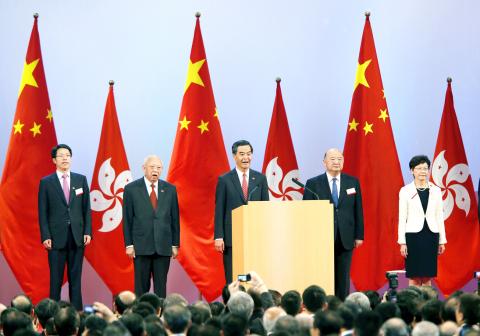Hong Kong Liaison Office Director Zhang Xiaoming (張曉明) has warned democracy campaigners in the former British colony against pushing for independence and confronting Beijing, Xinhua news agency reported.
Pro-democracy protesters in Hong Kong shut down major business districts for two-and-a-half months last year, with the “Umbrella movement” demanding open nominations in the next election of the territory’s chief executive in 2017.
Beijing has said it will allow a vote, but only for pre-screened candidates.

Photo: Reuters
In his most extensive comments since police cleared the protesters from the territory’s highways in mid-December, China’s top official in Hong Kong made it clear that Beijing is moving toward tighter control of the global financial hub.
“We could not allow any attempt to reject the central authority’s jurisdiction over Hong Kong under the pretext of a high degree of autonomy, to advocate ‘Hong Kong independence,’ or even to overtly confront with the central government through illegal ways,” Zhang said on Wednesday at a reception attended by top officials, according to Xinhua.
There is no mainstream independence movement in Hong Kong, although some activists want a continued campaign of civil disobedience this year to force Beijing to accept fully democratic elections.
Banners seeking to humiliate Hong Kong and Chinese leaders, including Chinese President Xi Jinping (習近平), festooned streets and government buildings during last year’s protests.
Democratic Legislative Council Legislator Emily Lau (劉惠卿) said Zhang’s comments were “improper and inappropriate” for a mainland official and blurred the boundaries between Hong Kong and China’s governance systems.
“It seems they want to interfere, they want to take the lead and it is very alarming,” Lau said.
Zhang on Wednesday said it was necessary to rethink the relationship between the two and that Hong Kong’s pro-democracy protests had proved its rule of law could be “fragile.”
Zhang also suggested Beijing could take a renewed interest in patriotic education, a touchy subject that sparked protests in Hong Kong in 2012.
“Priority should be given to the history, culture and national conditions of China in the education of the young people so that they could fully understand that the destiny and future of Hong Kong are closely connected to those of the motherland,” Zhang said, according to Xinhua.
About 4,000 people attended the reception where Zhang spoke, including Hong Kong Chief Executive Leung Chun-ying (梁振英), former Hong Kong chief executive Tung Chee-hwa (董建華), officials from state firms and foreign diplomats.

AIR SUPPORT: The Ministry of National Defense thanked the US for the delivery, adding that it was an indicator of the White House’s commitment to the Taiwan Relations Act Deputy Minister of National Defense Po Horng-huei (柏鴻輝) and Representative to the US Alexander Yui on Friday attended a delivery ceremony for the first of Taiwan’s long-awaited 66 F-16C/D Block 70 jets at a Lockheed Martin Corp factory in Greenville, South Carolina. “We are so proud to be the global home of the F-16 and to support Taiwan’s air defense capabilities,” US Representative William Timmons wrote on X, alongside a photograph of Taiwanese and US officials at the event. The F-16C/D Block 70 jets Taiwan ordered have the same capabilities as aircraft that had been upgraded to F-16Vs. The batch of Lockheed Martin

US President Donald Trump yesterday announced sweeping "reciprocal tariffs" on US trading partners, including a 32 percent tax on goods from Taiwan that is set to take effect on Wednesday. At a Rose Garden event, Trump declared a 10 percent baseline tax on imports from all countries, with the White House saying it would take effect on Saturday. Countries with larger trade surpluses with the US would face higher duties beginning on Wednesday, including Taiwan (32 percent), China (34 percent), Japan (24 percent), South Korea (25 percent), Vietnam (46 percent) and Thailand (36 percent). Canada and Mexico, the two largest US trading

GRIDLOCK: The National Fire Agency’s Special Search and Rescue team is on standby to travel to the countries to help out with the rescue effort A powerful earthquake rocked Myanmar and neighboring Thailand yesterday, killing at least three people in Bangkok and burying dozens when a high-rise building under construction collapsed. Footage shared on social media from Myanmar’s second-largest city showed widespread destruction, raising fears that many were trapped under the rubble or killed. The magnitude 7.7 earthquake, with an epicenter near Mandalay in Myanmar, struck at midday and was followed by a strong magnitude 6.4 aftershock. The extent of death, injury and destruction — especially in Myanmar, which is embroiled in a civil war and where information is tightly controlled at the best of times —

China's military today said it began joint army, navy and rocket force exercises around Taiwan to "serve as a stern warning and powerful deterrent against Taiwanese independence," calling President William Lai (賴清德) a "parasite." The exercises come after Lai called Beijing a "foreign hostile force" last month. More than 10 Chinese military ships approached close to Taiwan's 24 nautical mile (44.4km) contiguous zone this morning and Taiwan sent its own warships to respond, two senior Taiwanese officials said. Taiwan has not yet detected any live fire by the Chinese military so far, one of the officials said. The drills took place after US Secretary